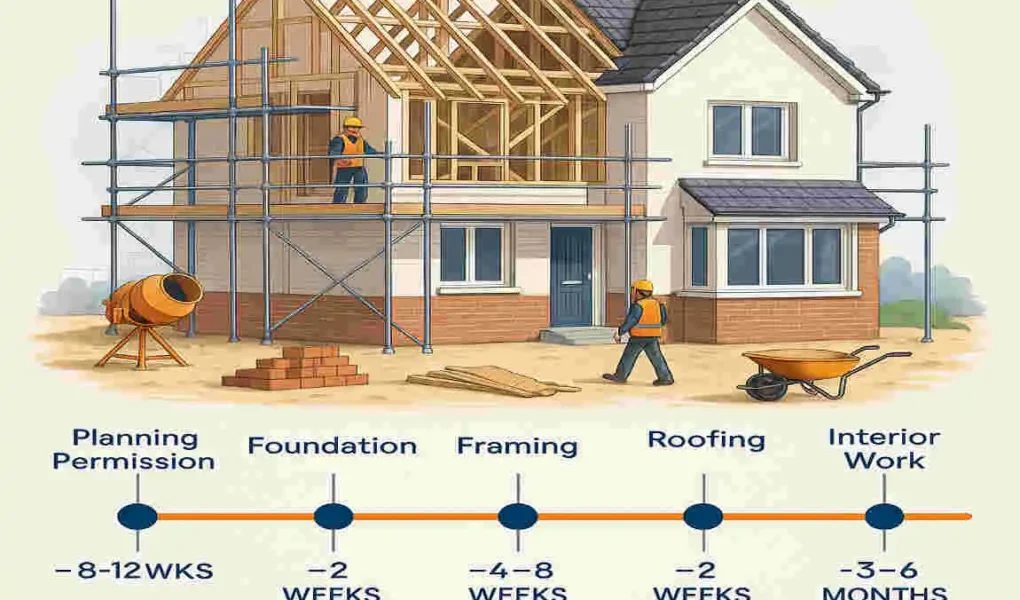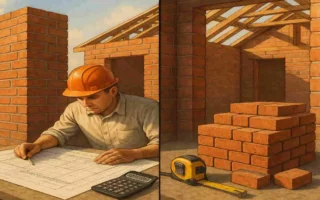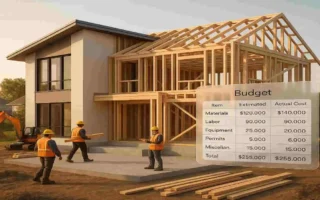Have you ever dreamt of building your own home in the UK? Whether it’s a cozy cottage in the countryside or a modern masterpiece in the city, the idea of creating a space that’s uniquely yours is fascinating. But before you dive into the world of self-building or custom homes, it’s crucial to understand the timeline, costs, and practical tips involved in this journey.
Understanding the House Building Process in the UK
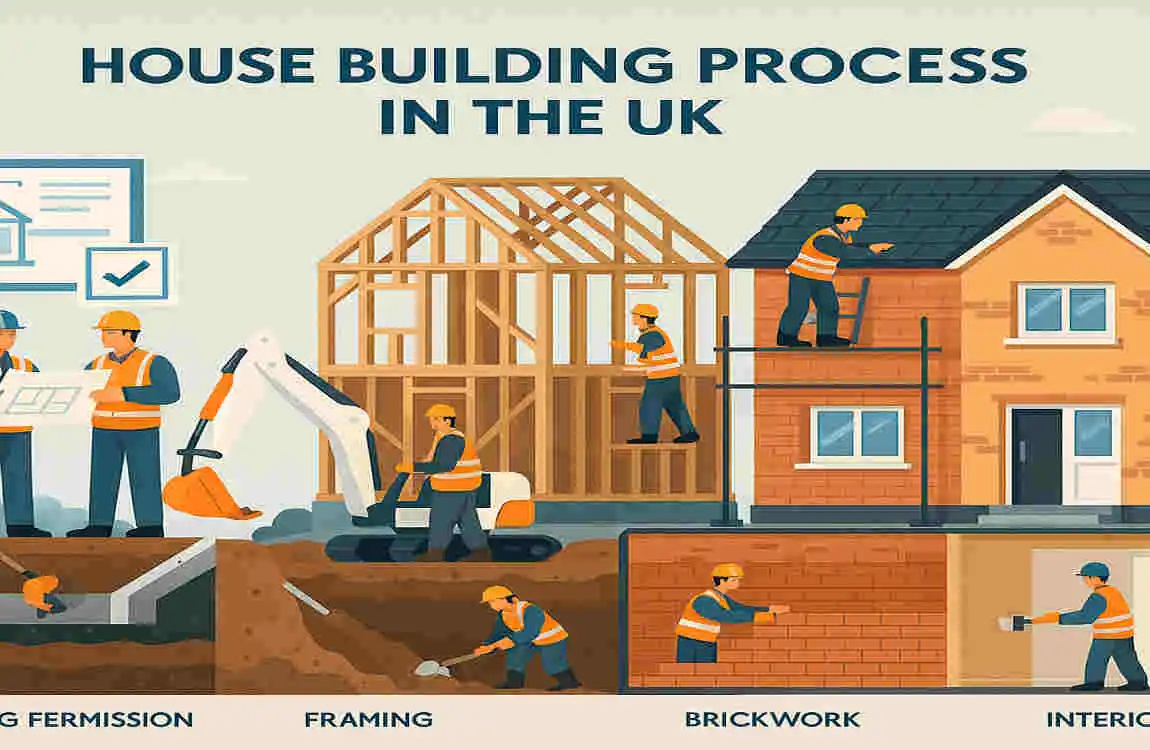
The Steps Involved in Building a House from Scratch
Building a house from the ground up is a multi-step process that requires careful planning and execution. Here’s a brief overview of the typical stages involved:
- Land acquisition or plot selection: Finding the perfect location for your new home.
- Design and planning: Working with architects and designers to create your dream home.
- Obtaining planning permission and building regulations approval: Ensuring your project complies with local regulations.
- Construction: The exciting part where your vision comes to life!
- Inspections and snagging: Ensuring everything is up to standard before moving in.
- Handover and moving in: The moment you’ve been waiting for – making your new house a home.
Differentiating Between Self-Build, Custom Build, and Developer-Built Homes
When it comes to building a house in the UK, you have several options to consider:
- Self-build: You take on the role of project manager and oversee the entire construction process.
- Custom build: You work with a developer or builder to create a bespoke home tailored to your needs.
- Developer-built homes: Purchasing a pre-designed home from a developer.
Each option has its own timeline, costs, and level of involvement, so it’s essential to choose the path that best suits your needs and preferences.
Legal and Regulatory Considerations Impacting the Timeline
Building a house in the UK involves navigating a range of legal and regulatory requirements that can impact your timeline. Some key considerations include:
- Planning permission: Obtaining approval from your local authority for your building project.
- Building regulations: Ensuring your home meets minimum standards for safety, accessibility, and energy efficiency.
- Environmental and conservation regulations: Protecting local ecosystems and heritage sites.
Understanding these requirements and working closely with your local authorities can help streamline the process and keep your project on track.
Typical Timeline to Build a House in the UK
Pre-Construction Phase (1-3 Months)
Before the first brick is laid, there’s a lot of groundwork to be done. Here’s what you can expect during the pre-construction phase:
Land Acquisition or Plot Selection
Finding the perfect plot of land for your new home can take anywhere from a few weeks to several months, depending on your location and preferences. You’ll need to consider factors like accessibility, views, and local amenities when making your decision.
Planning Permission and Building Regulations Approval
Obtaining planning permission and building regulations approval is a crucial step that can significantly impact your timeline. The process typically takes 8-12 weeks, but it can be longer if your project is complex or if there are objections from neighbors or local authorities.
Financing and Project Planning
Securing financing for your project and finalizing your budget and timeline are essential before breaking ground. This can take anywhere from a few weeks to a couple of months, depending on your financial situation and the complexity of your project.
Construction Phase (9-12 Months)
Once the pre-construction phase is complete, it’s time to start building your dream home. Here’s a breakdown of the typical stages and estimated timeframes:
Groundworks and Foundations (1-2 Months)
The first step in the construction process is preparing the site and laying the foundations. This can take anywhere from 4-8 weeks, depending on the size and complexity of your project.
Structural Framework (2-3 Months)
Once the foundations are in place, it’s time to start building the structural framework of your home. This includes erecting walls, installing beams, and creating the basic shape of your house. This stage typically takes 8-12 weeks.
Roofing and External Walls (1-2 Months)
With the structural framework in place, the next step is to Install the roof and external walls. This can take anywhere from 4-8 weeks, depending on the size and complexity of your project.
Windows, Doors, and Exterior Finishes (1-2 Months)
Once the roof and external walls are complete, it’s time to Install windows, doors, and other exterior finishes. This stage typically takes 4-8 weeks.
Interior Work: Plumbing, Wiring, Insulation (2-3 Months)
With the exterior of your home complete, it’s time to focus on the interior. This includes installing plumbing, wiring, insulation, and other essential systems. This stage typically takes 8-12 weeks.
Final Finishes and Fixtures (1-2 Months)
The final stage of construction involves installing final finishes and fixtures, such as flooring, cabinetry, and appliances. This can take anywhere from 4-8 weeks, depending on the size and complexity of your project.
Post-Construction (1-2 Months)
Once construction is complete, there are a few final steps to take before moving into your new home:
Inspections and Snagging
Before you can move in, your home will need to undergo a series of inspections to ensure it meets all relevant standards and regulations. This process typically takes 1-2 weeks.
Handover and Moving In
Once your home has passed all inspections, it’s time for the handover and moving-in process. This can take anywhere from a few days to a couple of weeks, depending on the size of your home and the amount of furniture you need to move.
Factors That Can Extend or Shorten the Timeline
While the typical timeline for building a house in the UK is around 12-18 months, several factors can impact the duration of your project:
- Weather: Adverse weather conditions can delay construction, especially during the winter months.
- Contractor delays: If your contractor falls behind schedule, it can push back your entire timeline.
- Design complexity: More complex designs can take longer to build and may require additional approvals or inspections.
- Supply chain issues: Delays in the delivery of materials can slow down construction.
- Labour shortages: A lack of skilled labour can impact the speed of your build.
By understanding these factors and working closely with your contractor and project manager, you can help keep your project on track and minimize delays.
Cost Breakdown and Budgeting Tips for Building a House in the UK
Average Costs per Square Foot/Metre in Different Regions of the UK
The cost of building a house in the UK can vary significantly depending on your location. Here’s a rough breakdown of average costs per square foot/metre in different regions:
Region Average Cost per Square Foot Average Cost per Square Metre
London £300 – £500 £3,230 – £5,380
South East £250 – £400 £2,690 – £4,300
South West £200 – £350 £2,150 – £3,770
East of England £200 – £300 £2,150 – £3,230
Midlands £150 – £250 £1,610 – £2,690
North of England £150 – £200 £1,610 – £2,150
Scotland £150 – £200 £1,610 – £2,150
Wales £150 – £200 £1,610 – £2,150
Northern Ireland £100 – £150 £1,080 – £1,610
Keep in mind that these are rough estimates, and your actual costs may vary depending on factors like the size and complexity of your project, the quality of materials you choose, and local market conditions.
Itemized Cost Overview: Land, Materials, Labour, Permits, and Fees
When budgeting for your home build, it’s essential to consider all the costs involved. Here’s a rough breakdown of what you can expect to pay for each item:
- Land: Depending on your location, the cost of land can range from £50,000 to £500,000 or more.
- Materials: The cost of building materials can vary widely depending on the quality and quantity you need. On average, you can expect to pay around £1,000 – £1,500 per square metre.
- Labour: The cost of labour will depend on the size and complexity of your project, as well as local market rates. On average, you can expect to pay around £200 – £300 per square metre.
- Permits and fees: Depending on your location and the size of your project, you may need to pay for planning permission, building regulations approval, and other permits and fees. These can range from a few hundred to several thousand pounds.
Hidden and Unexpected Costs to Anticipate
When building a house, it’s essential to budget for unexpected costs that may arise during the construction process. Some common hidden fees include:
- Design changes: If you decide to make changes to your design during the construction process, it can add to your overall costs.
- Unexpected site conditions: If your site has unexpected challenges, such as poor soil quality or hidden utilities, it can increase your costs.
- Delays: If your project is delayed due to weather, contractor issues, or other factors, it can increase your costs.
- Contingency fund: It’s always a good idea to set aside a contingency fund of around 10-20% of your total budget to cover any unexpected costs that may arise.
Budgeting Strategies to Control Expenses
Building a house can be a significant investment, but there are several strategies you can use to control your expenses and stay within your budget:
- Get multiple quotes: When selecting contractors and suppliers, always get multiple quotes to ensure you’re getting the best value for your money.
- Prioritize your spending: Decide which aspects of your home are most important to you and allocate your budget accordingly.
- Consider cost-saving materials: There are many cost-effective building materials available that can help you save money without compromising on quality.
- Monitor your budget closely: Keep a close eye on your spending throughout the construction process to ensure you stay within your budget.
How Timeline Impacts the Overall Cost
The timeline of your project can have a significant impact on your overall costs. Here’s how:
- Longer timelines can increase costs: If your project takes longer than expected, it can increase your labour and material costs, as well as any financing costs you may have.
- Shorter timelines can save money: If you can complete your project quickly and efficiently, it can help you save money on labour and materials.
- Delays can be costly: If your project is delayed due to weather, contractor issues, or other factors, it can increase your overall costs.
By understanding how the timeline impacts your costs, you can make informed decisions throughout the construction process to help keep your project on track and within budget.
Essential Construction Tips to Speed Up Your House Build Without Compromising Quality
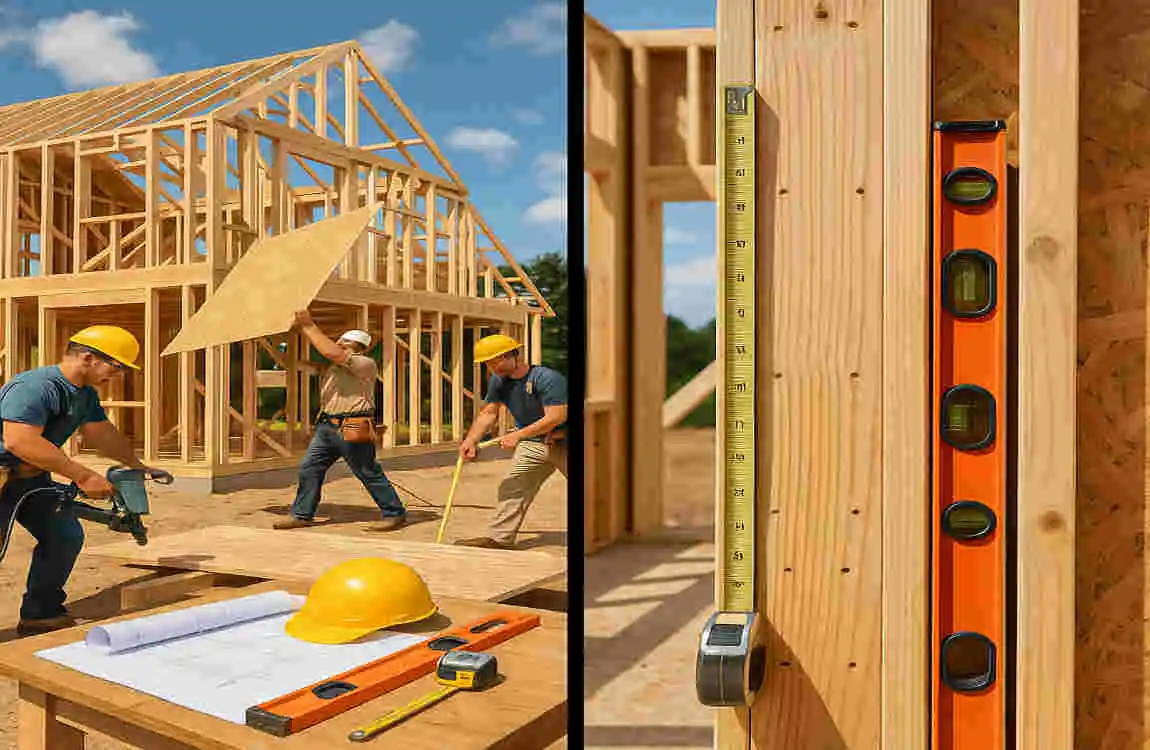
Choosing the Right Contractor and Project Manager
One of the most important decisions you’ll make when building a house is choosing the right contractor and project manager. Here are some tips to help you make the right choice:
- Please do your research: Take the time to research potential contractors and project managers to ensure they have the experience and expertise you need.
- Get references: Ask for references from previous clients to get a sense of their work quality and reliability.
- Communicate clearly: Make sure you have a clear understanding of your project goals and timeline, and communicate these clearly to your contractor and project manager.
Importance of Detailed Planning and Clear Communication
Detailed planning and clear communication are essential for keeping your project on track and within budget. Here’s how you can ensure effective planning and communication:
- Create a detailed project plan: Work with your contractor and project manager to create a detailed project plan that outlines all the stages of your build and the expected timeline for each.
- Communicate regularly: Schedule regular meetings with your contractor and project manager to discuss progress, address any issues, and make any necessary adjustments to your plan.
- Be flexible: Be prepared to adapt your plan if unexpected challenges arise during the construction process.
Using Prefabricated or Modular Construction to Reduce Build Time
Prefabricated or modular construction can be an excellent way to speed up your build time without compromising on quality. Here’s how it works:
- Prefabricated construction: With prefabricated construction, many of the components of your home are built off-site in a factory and then assembled on-site. This can significantly reduce the time it takes to complete your build.
- Modular construction: With modular construction, your home is built in sections or modules in a factory and then transported to your site and assembled. This can also help speed up your build time.
Efficient Project Management Tools and Techniques
Using efficient project management tools and techniques can help keep your build on track and within budget. Here are some tools and techniques to consider:
- Project management software: There are many project management software options available that can help you track progress, manage budgets, and communicate with your team.
- Gantt charts: Gantt charts are a valuable tool for visualizing your project timeline and keeping track of milestones and deadlines.
Planning for Contingencies and Flexible Scheduling
Even with the best planning and communication, unexpected challenges can arise during the construction process. Here’s how you can plan for contingencies and maintain a flexible schedule:
- Build in contingency time: When creating your project plan, build in some extra time to account for any unexpected delays or issues.
- Be prepared to adapt: Be ready to adjust your plan if unexpected challenges arise, such as weather delays or supply chain issues.
- Communicate with your team: Keep your team informed of any changes to the plan and work together to find solutions to any challenges that arise.
Common Challenges and Delays in Building a House in the UK
Planning Permission Delays and How to Avoid Them
One of the most common challenges when building a house in the UK is obtaining planning permission. Here’s how you can avoid delays:
- Do your research: Before submitting your planning application, research your local planning policies and requirements to ensure your project complies.
- Work with a professional: Consider working with a professional planning consultant to help you navigate the process and avoid delays.
- Submit a complete application: Make sure your planning application is complete and includes all the necessary information to avoid delays.
Weather Impacts and Seasonal Considerations
Weather can have a significant impact on your build timeline, especially during the winter months. Here’s how you can plan for weather-related delays:
- Build in extra time: When creating your project plan, build in some extra time to account for potential weather-related delays.
- Consider seasonal construction: Try to schedule your build during the warmer months to minimize the risk of weather-related delays.
- Work with your contractor: Communicate with your contractor to develop a plan for dealing with weather-related delays and keeping your project on track.
Supply Chain Issues Affecting Materials Delivery
Supply chain issues can also impact your build timeline, especially if there are delays in the delivery of materials. Here’s how you can mitigate these issues:
- Order materials early: Order your materials well in advance to ensure they arrive on time.
- Work with reliable suppliers: Choose reliable suppliers who have a track record of delivering materials on time.
- Have a backup plan: Develop a backup plan in case of supply chain issues, such as identifying alternative suppliers or materials.
Labour Shortages and Strikes
Labour shortages and strikes can also impact your build timeline. Here’s how you can plan for these challenges:
- Hire reliable contractors: Choose reliable contractors who have a track record of completing projects on time.
- Build in extra time: When creating your project plan, build in some extra time to account for potential labour-related delays.
- Communicate with your team: Keep your team informed of any labour-related issues and work together to find solutions.
How to Mitigate Delays Proactively
By planning ahead and communicating effectively with your team, you can mitigate delays and keep your project on track. Here are some proactive steps you can take:
- Monitor progress closely: Keep a close eye on progress and address any issues as soon as they arise.
- Communicate regularly: Schedule regular meetings with your contractor and project manager to discuss progress and address any issues.
- Be flexible: Be prepared to adapt your plan if unexpected challenges arise during the construction process.

